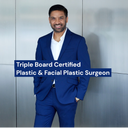I've had cataract and glaucoma surgery. Will I be able to get upper eyelid surgery?
Hello, I have done glaucoma and cataract surgery before and I had a tube shunt in the eye, I have severe droopy eyelid on the eye that has the issue. And it’s kinda blocking my eyes, I have tried raising the excess skin up to see how I would look if I had the upper eyelid surgery and the tube shunt isn’t showing and I don’t have dry eyes at all. Will I be able to get it.






